Expert Q&A: Xiuhtezcatl Martinez
By Amy Nelson
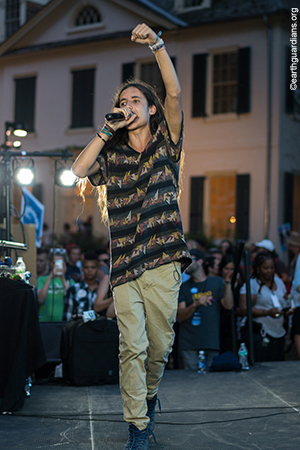 Indigenous climate activist, Xiuhtezcatl (pronounced ‘Shu-Tez-Caht’) Martinez began speaking out on behalf of the environment at the age of six. Today, at 17, Xiuhtezcatl continues to inspire worldwide audiences, but his voice extends far beyond speeches, TED Talks, and talk show appearances. He recently released both his first book, We Rise, and the first single from his debut hip-hop album, Break Free. As youth director of the non-profit organization Earth Guardians, he is at the forefront of an environmental movement that is mobilizing young people around the globe. He is also a plaintiff in a landmark lawsuit against the U.S. Government, which asserts that the government has violated the public trust doctrine and the youngest generation’s constitutional rights to life, liberty, and property.
Indigenous climate activist, Xiuhtezcatl (pronounced ‘Shu-Tez-Caht’) Martinez began speaking out on behalf of the environment at the age of six. Today, at 17, Xiuhtezcatl continues to inspire worldwide audiences, but his voice extends far beyond speeches, TED Talks, and talk show appearances. He recently released both his first book, We Rise, and the first single from his debut hip-hop album, Break Free. As youth director of the non-profit organization Earth Guardians, he is at the forefront of an environmental movement that is mobilizing young people around the globe. He is also a plaintiff in a landmark lawsuit against the U.S. Government, which asserts that the government has violated the public trust doctrine and the youngest generation’s constitutional rights to life, liberty, and property.
Xiuhtezcatl spoke with us from his family’s home in Boulder, Colorado.
Can you tell us a bit about Earth Guardians and your role in the organization?
Earth Guardians was started as an accredited high school in Maui, Hawaii. From there the vision was to give young people on the island a voice, a platform, and a place to receive an alternative education based on experiential learning and teaching young people critical skills they need in high school that also teach them how to protect the planet. In 1995, the 25 students from the school went on the Children’s Torch of Hope Tour across the U.S. and presented and performed at high profile events in 29 states. They collected documents from youth across the US who were concerned about their future and presented them in the United Nations in New York. A lot of the students were hip hop artists, so those performances included a lot of choreographed dance pieces and conscious raps. I was a little kid then, about 3 or 4, but my older sister Isa took up the lead here in Boulder, CO. She was leading campaigns to stop plastic bags. Soon she was doing events all over the country, including rallies with Robert F. Kennedy Jr. In 2009, she went off to do her own thing and pursue music, and that is when I got involved as the new Youth Director of Earth Guardians. I had a vision to stop the pesticides that were being sprayed in my local park. After we—a handful of kids in my community from ages 6 to 12—won that issue, we had a massive awakening. We realized that when we get together we have so much power. So we started taking action on all kinds of issues in our community. We spoke out against fracking, fossil fuel extraction, and a coal power plant that was powering our city. From there, it caught fire, and Earth Guardians is a now global movement of 150 “crews” of young people in 30 different countries who are mobilized in a very decentralized network to fight for change.
Can you give an example of an action that one of those crews outside of the US took on behalf of the earth and how Earth Guardians helped make that happen?
Four times a year, Earth Guardians has these big days of action called “Protect Our Future.” Each day of action focuses on a different issue: Protect our Earth, Protect our Water, Protect our Air, and Protect our Climate. During Protect our Earth 2016, there was a huge mobilization of Earth Guardians in Togo and Ghana. We started off having only one crew in Togo, and they began by teaching about environmental protection, water rights, and the importance of clean water.
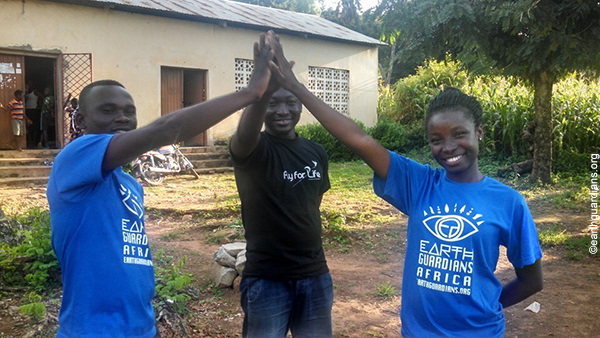
The director of the Togo crew, a very impressive young man named Mensa Tsedze (who is now employed by Earth Guardians as a regional director), went to Ghana and took the message of Earth Guardians to different universities and started five or six new Earth Guardian chapters that stretched from Togo to Ghana. Now there are thousands of youth mobilized in that part of the world. These youth made a pledge to plant thousands of trees. During Protect our Earth 2016, they planted around 10,000 trees. Their goal for 2017 was to plant 16,000 trees by May…and they did it. In a five-month period, in a region that has far less resources than we have here in the U.S., they planted 16,000 trees.

What is important to notice in that story is that regardless of how privileged we are, or what kind of community we come from, there is an understanding that we do this work to protect what we love. Whether you are a Water Protector at Standing Rock who is fighting for the rights of your ancestors and grandchildren, or someone who is choosing to recycle or skip out on eating meat one day, you are taking this action from a place of love.
What made you want to spread a message about climate change?
When I was really little, I saw a documentary about climate change called The 11th Hour and it freaked me out. I was seven years old, and I was like, “How are we allowing this to happen to our world?” It was such a messed up wake-up call for me. I took myself very seriously and said, “This is my path. This is what I need to dedicate my life to.”
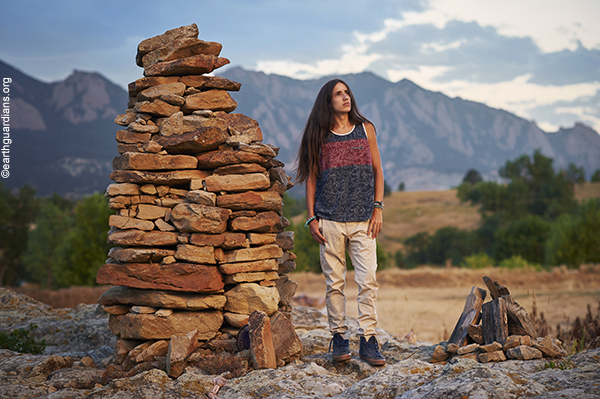
As I grew up, and looked at all kinds of issues—social justice, Black Lives Matter, poverty, oppression of indigenous communities, social and financial inequality—I saw that climate change was connected to all of them. We could be really passionate about protecting our waterways and oceans, or human rights, or the refugee crisis, or food justice. But if you zoom out, you see that all of these issues are tied together by the cause and effects of climate justice. The cause is the fossil fuel empire that is destroying our planet and communities all over the world. The effects are the rising of the seas, forest fires, floods, droughts, hurricanes, and increased tragedies we see worldwide.
By the time this interview comes out, your fist book “We Rise: The Earth Guardians Guide to Building a Movement that Restores the Planet” (Rodale Books) will be published. Why did you write this book, and who did you have in mind as the audience?
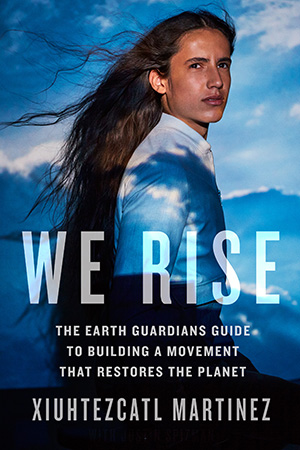 Why did I write the book? I felt like the world needed it.
Why did I write the book? I felt like the world needed it.
After Trump got elected, I saw a lot of people angry about a lot of different things. I saw so much anger among my peers. A lot of people in my generation were going to rallies and chanting, but they didn’t really know what was going on. This book paints a very clear picture of what is going on. It looks very deeply into issues like our oceans, food justice, biodiversity, community organizing, and fossil fuel resistance.
The book gives a comprehensive breakdown of what is happening in the world, and pairs it with comprehensive solutions in every field of crisis that we can use to engage in change. At the end of every chapter there is a call to action. It offers a perspective on the movement that hasn’t been shared, and that is from the eyes of a young man who has grown up in it.
Who is the target audience? People who are looking for something to hold onto. People who are looking for something more: a way to engage and learn. I want the book to be a source of information and hope.
*Editor’s note: we review We Rise in the Book Reviews section of Leaf Litter.
You are one of 21 plaintiffs in the landmark Juliana v. U.S. lawsuit claiming that the federal government has violated the youngest generation’s constitutional right to life, liberty, and property. The trial date is now set for Feb. 5 of 2018. How do you prepare for a case like that?
We have made a lot of progress in the last several months. It is crazy that we have gotten this far. [See this summary of the status of the lawsuit for details.]
On our end, we have a lot to prepare, because if we are going to be called to the stand, there is a lot we have to be studied up on. Our lawyers and legal reps are doing a lot to gather evidence to piece together our case. This involves asking the federal government to provide different legal documents and to have government staff come to the stand and deliver statements. In July, the federal government filed a “writ of mandamus” with the U.S. Court of Appeals for the 9th Circuit Court. That means that the government is saying, “This lawsuit is going to hurt us because we don’t have the time to find the legal documents they are requesting, we don’t have time to put staff in the courthouse to be on the stand and answer questions.” So we are now in a pause. The 9th Circuit Court is now requiring written arguments from all the different parties—including the last two judges who heard our case. It’s ridiculous.
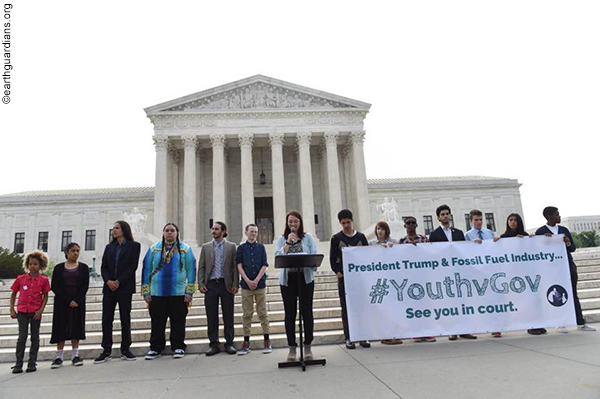
The Trump administration is taking a victimized approach and belittling our issue. We are talking about the violation of the constitutional rights of youth in America and they’re talking about inconvenience.
Does that mean the trial may not happen in February?
We are confident that we will move through this barrier and be in trial by February without needing that much from the federal government. We already have a lot of the evidence that we need to win this lawsuit.
Are any of the Earth Guardian crews in other countries following this example and suing their governments?
It is tricky to support legal proceedings in other countries. Here, we have a solid, incredible team of lawyers who have been on the ground working on this lawsuit since 2014. They know how to work the legal system in a way that will give us a chance at winning. Every country has its own limitations and boundaries as far as its ability to hold their government accountable. One of the goals of Our Children’s Trust, which is the legal organization behind the lawsuit, is to expand to other countries and get international support.
I’d like to shift gears and talk about your music. What does your music mean to you? How powerful do you think it is in terms of reaching people with messages about saving and restoring the planet?
Young people, especially those in high school, are going to shuffle their playlist more often than they’re going to listen to a TED Talk. That’s true for me, too. I’d rather listen to music than listen to someone talk. But a lot of the music we are listening to is garbage.
Music is so powerful. It is this cultural tool that communities have used for centuries to tell stories. In my own heritage [Xiuhtezcatl’s father is of the Mashika Aztec people], we have always used song as a storytelling tool and a way to connect and bring people together. Now, we’re in this world where music has become a commodity. The music business has surpassed the music itself. A lot of music is written to glorify capitalism and money in order to feed into that and make money.
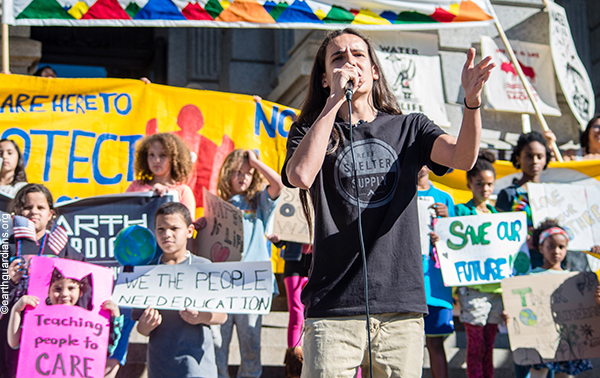
I started making music and writing raps so that when I gave presentations to elementary and middle schools, I could do something that was more relatable to youth. Back then, it was just another tool, another slide in my slide show. As I got older and started performing more, and I saw people cry at my concerts, I was like, “Holy shit. I am moving people to feel something.” That is powerful—whether you are on stage in front of 2000 people or on a street corner with a bullhorn rapping about fracking for 20 people.
Seeing the power of music and the ability it gave me to tell my story was huge. We dropped our first album as Earth Guardians in 2013. It was pretty cute. I was quite the young scrub, and I was going through puberty so my voice was way higher. Now, I’m getting booked to play music festivals all over the country, and being an artist is becoming a much more legitimate role of mine. I have also broken out of that shell of “I need to write this for the movement, the oceans, or the environment.” I’m writing music because of how I feel. If how I feel is gloom because of the state of the planet, then that’s what I’m going to write about. If I feel heartbroken because I just broke up with my girlfriend of 10 months, I will write about that. A lot of the songs I’m writing are about who I am, and how the world sees me vs. who I really am.
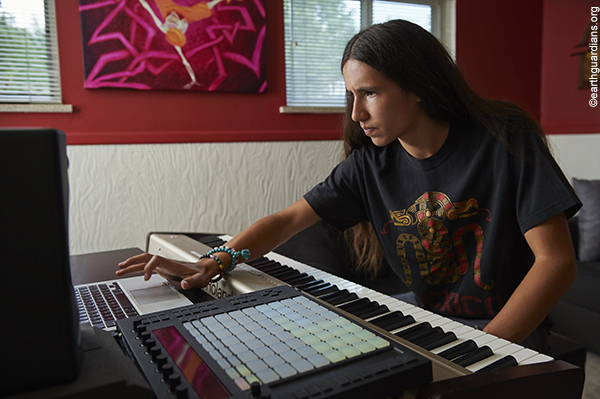
I’m working on my debut solo album right now. It is called Break Free and it has some pretty exciting features. I’m producing it myself, working in LA with other musicians, producers, and artists. I’m so excited. I’m dropping my single in the next couple of days.
Music has become my favorite medium. It’s not only about getting on a stage and making people move, dance and put their hands in the sky, but also having a message behind that.
How can our readers get a taste of your music?
You can head to my web site: xiuhtezcatl.com. The album will probably drop in October or November, and you will also be able to find it on Spotify, iTunes and Bandcamp.
You have said that “the planet doesn’t need saving, we do.” Out of the many tools you have employed- the book, the speeches, the TV appearances, the music and music videos- do you think music has the greatest potential in terms of shifting human consciousness?
I’d say so. Music has taken me so far, and it has enabled me to swim in the mainstream. Activists limit themselves to grassroots community organizing, but I don’t think that is ambitious or big-picture thinking. We have to get our message mainstream and engage at a bigger level and have people listen to us everywhere. Music has the power to do that. It has given me opportunities to do a campaign with Adidas and a clothing line with Kenzo, which will massively raise my visibility.
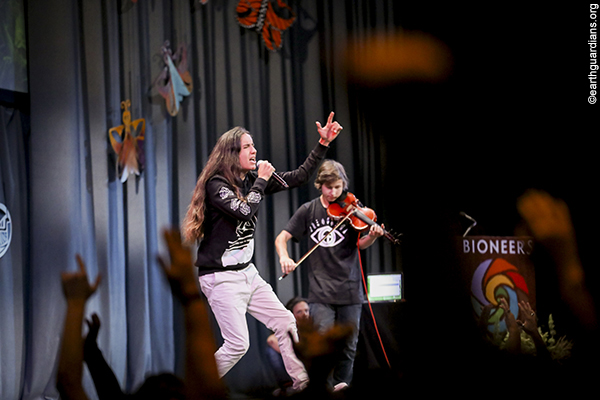
This is bigger than community organizing. This is survival of our generation. To tell that story appropriately, we have to communicate the urgency of it.
I read that your father taught you that “Everything is sacred.” Many people—young and old—might say today that “Everything in my iPhone is sacred.” Have you had to struggle with getting people to lift their gazes above and beyond their devices? If so, what have you found to be effective ways of doing that?
It’s super convenient to have an iPhone. Anytime any bullshit happens to you, you just tune out. I’m as guilty as the next person. When I get depressed or upset about something, or I don’t want to hear about the world, I’ll just scroll. We scroll. That’s what we do. We watch YouTube videos and Instagram videos. We waste so much time. It is incredible. It’s a stereotype to think that all of my generation is like that, but a lot of us are. You wake up in the morning and the first thing you do is grab your phone and check social media. When that is the first thing you do when you wake up and the last thing you do before you go to bed, that is messed up.
But I also recognize that social media and technology are two of the most important tools we have to utilize in order to create the world we want. They have been used to inspire and cultivate revolution, expose hideous injustice, and organize things like the Women’s March and the People’s Climate March. The media is not bad, but a lot of the content is. It’s a really beautiful tool that can generate change, but it can also be a tool of escape for a generation of people who don’t want to deal with how messed up things are. It’s important to find that balance.
So if you have an iPhone, use it for the best. Scroll when you need to, but try to make that less and not more often.
Many of our readers have been studying and working to restore ecosystems for decades. They have lived through a lot of heartache and seen species die off…coral reef bleaching…habitat loss… Adults love to impart wisdom on youth, but in this case, I think they could use some advice from you. Do you have any to offer them?
The world is a pretty intense, heavy place, whether you’re a young or old person or anybody. Whether it’s because high school is hard and you’re struggling with classes, or because your friend just took his life, or because you realize that the planet we’re all living on is falling apart. There are so many layers that can make you really sad.
I have definitely gone through places of depression and hopelessness. I have realized how important it is to connect with other people who are in a similar place as us, who can uplift us, and show us that there is something beautiful to hope for. The greatest inspiration I have ever pulled from in my life is from my peers—my friends. That is where I find the power of our world and our generation—in the minds, hearts, and ideas of the brilliant young people who are shaping our culture.
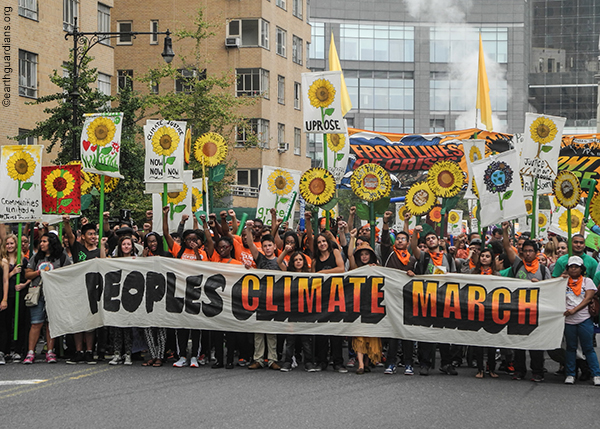
If you’re hopeless, find your tribe. If you feel alone, find your tribe. If your tribe is as pessimistic as you are, find more people to join your tribe who aren’t like that. I’d argue there are just as many incredible things happening in the world as there are bad things. Focus on the light and positivity. Take a moment to think about that and acknowledge how beautiful this world is.
I’d also say take responsibility and realize that everything you do in your life is rippling out and affecting the world. Realize that a lot of the things we are sad about, we can do something about just by changing our lifestyle.
What are the best ways our readers can reach out to young people, get them involved in their work, and tap into some of that brilliance you mentioned?
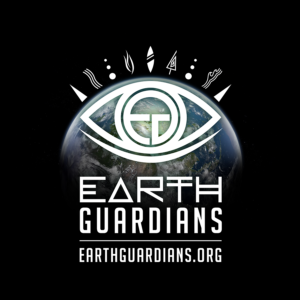 Definitely hit up earthguardians.org. The ability to create community with that platform is powerful. If you are an adult who is interested in engaging young people in creating change, you might want to foster a group and start an Earth Guardian crew. You can get a bunch of young people involved and you can start taking action, hosting meetings, doing educational programs—whatever it looks like. Whether you are an adult or a young person, starting an Earth Guardian crew is one of the most powerful things you can do.
Definitely hit up earthguardians.org. The ability to create community with that platform is powerful. If you are an adult who is interested in engaging young people in creating change, you might want to foster a group and start an Earth Guardian crew. You can get a bunch of young people involved and you can start taking action, hosting meetings, doing educational programs—whatever it looks like. Whether you are an adult or a young person, starting an Earth Guardian crew is one of the most powerful things you can do.
Being an activist requires passion, but also bravery and stamina. It sounds like your schedule is incredibly busy. You have likely addressed the UN more times than most people have spoken in front of a group of people in a conference room. I imagine you have also had to think about potential dangers of speaking out against the fossil fuel industry. What is the source of your strength, determination, courage, and energy to keep going?
My source of inspiration is solely from knowing that I’m not alone and being around other people who are fighting for the same thing I am. People always ask me who my heroes are, and I draw my hope, inspiration, and strength from the other people in my generation who are fighting for things to be different than they are, and believing that things can be better. I also draw from a love and a passion for life. For nature, music, dank ass food, and everything beautiful about this world. That’s where I draw my passion from because that is what I’m fighting to protect.
Can you tell us a bit about Earth Guardians and your role in the organization?
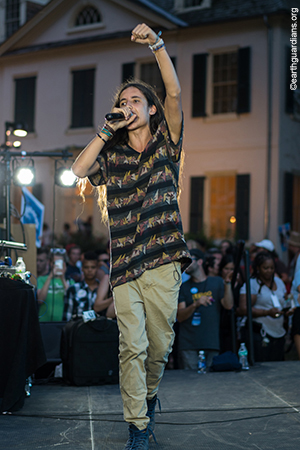 Earth Guardians was started as an accredited high school in Maui, Hawaii. From there the vision was to give young people on the island a voice, a platform, and a place to receive an alternative education based on experiential learning and teaching young people critical skills they need in high school that also teach them how to protect the planet. In 1995, the 25 students from the school went on the Children’s Torch of Hope Tour across the U.S. and presented and performed at high profile events in 29 states. They collected documents from youth across the US who were concerned about their future and presented them in the United Nations in New York. A lot of the students were hip hop artists, so those performances included a lot of choreographed dance pieces and conscious raps. I was a little kid then, about 3 or 4, but my older sister Isa took up the lead here in Boulder, CO. She was leading campaigns to stop plastic bags. Soon she was doing events all over the country, including rallies with Robert F. Kennedy Jr. In 2009, she went off to do her own thing and pursue music, and that is when I got involved as the new Youth Director of Earth Guardians. I had a vision to stop the pesticides that were being sprayed in my local park. After we—a handful of kids in my community from ages 6 to 12—won that issue, we had a massive awakening. We realized that when we get together we have so much power. So we started taking action on all kinds of issues in our community. We spoke out against fracking, fossil fuel extraction, and a coal power plant that was powering our city. From there, it caught fire, and Earth Guardians is a now global movement of 150 “crews” of young people in 30 different countries who are mobilized in a very decentralized network to fight for change.
Earth Guardians was started as an accredited high school in Maui, Hawaii. From there the vision was to give young people on the island a voice, a platform, and a place to receive an alternative education based on experiential learning and teaching young people critical skills they need in high school that also teach them how to protect the planet. In 1995, the 25 students from the school went on the Children’s Torch of Hope Tour across the U.S. and presented and performed at high profile events in 29 states. They collected documents from youth across the US who were concerned about their future and presented them in the United Nations in New York. A lot of the students were hip hop artists, so those performances included a lot of choreographed dance pieces and conscious raps. I was a little kid then, about 3 or 4, but my older sister Isa took up the lead here in Boulder, CO. She was leading campaigns to stop plastic bags. Soon she was doing events all over the country, including rallies with Robert F. Kennedy Jr. In 2009, she went off to do her own thing and pursue music, and that is when I got involved as the new Youth Director of Earth Guardians. I had a vision to stop the pesticides that were being sprayed in my local park. After we—a handful of kids in my community from ages 6 to 12—won that issue, we had a massive awakening. We realized that when we get together we have so much power. So we started taking action on all kinds of issues in our community. We spoke out against fracking, fossil fuel extraction, and a coal power plant that was powering our city. From there, it caught fire, and Earth Guardians is a now global movement of 150 “crews” of young people in 30 different countries who are mobilized in a very decentralized network to fight for change.
Can you give an example of an action that one of those crews outside of the US took on behalf of the earth and how Earth Guardians helped make that happen?
Four times a year, Earth Guardians has these big days of action called “Protect Our Future.” Each day of action focuses on a different issue: Protect our Earth, Protect our Water, Protect our Air, and Protect our Climate. During Protect our Earth 2016, there was a huge mobilization of Earth Guardians in Togo and Ghana. We started off having only one crew in Togo, and they began by teaching about environmental protection, water rights, and the importance of clean water.
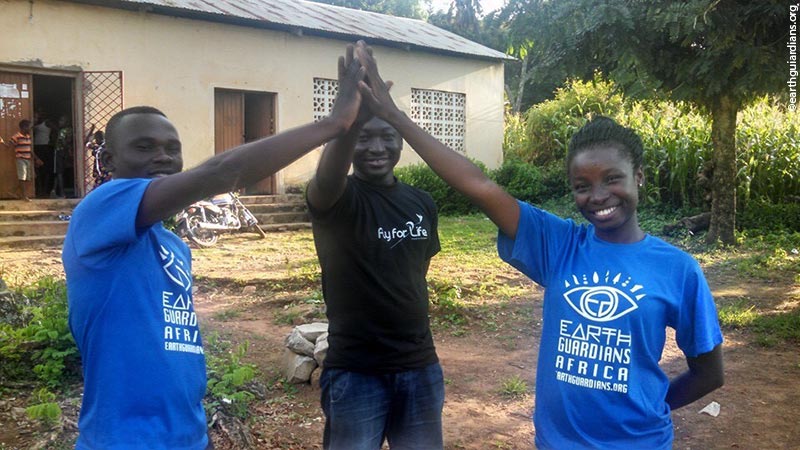
The director of the Togo crew, a very impressive young man named Mensa Tsedze (who is now employed by Earth Guardians as a regional director), went to Ghana and took the message of Earth Guardians to different universities and started five or six new Earth Guardian chapters that stretched from Togo to Ghana. Now there are thousands of youth mobilized in that part of the world. These youth made a pledge to plant thousands of trees. During Protect our Earth 2016, they planted around 10,000 trees. Their goal for 2017 was to plant 16,000 trees by May…and they did it. In a five-month period, in a region that has far less resources than we have here in the U.S., they planted 16,000 trees. What is important to notice in that story is that regardless of how privileged we are, or what kind of community we come from, there is an understanding that we do this work to protect what we love. Whether you are a Water Protector at Standing Rock who is fighting for the rights of your ancestors and grandchildren, or someone who is choosing to recycle or skip out on eating meat one day, you are taking this action from a place of love.

What made you want to spread a message about climate change?
When I was really little, I saw a documentary about climate change called The 11th Hour and it freaked me out. I was seven years old, and I was like, “How are we allowing this to happen to our world?” It was such a messed up wake-up call for me. I took myself very seriously and said, “This is my path. This is what I need to dedicate my life to.”
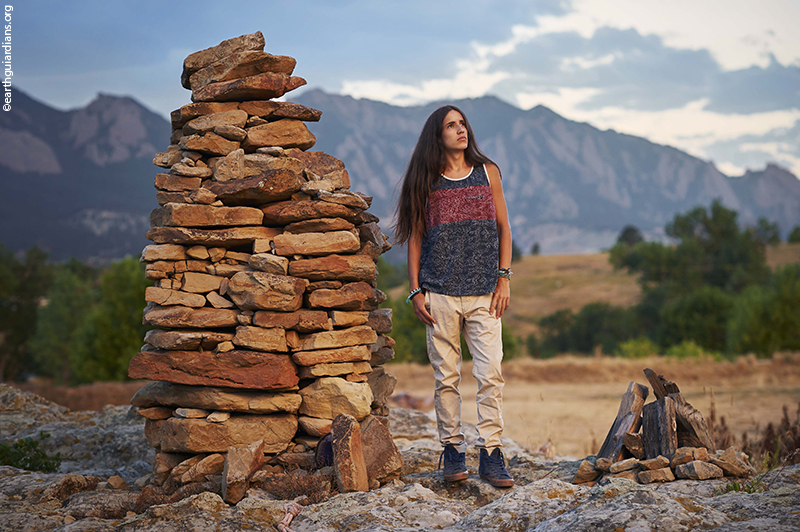
As I grew up, and looked at all kinds of issues—social justice, Black Lives Matter, poverty, oppression of indigenous communities, social and financial inequality—I saw that climate change was connected to all of them. We could be really passionate about protecting our waterways and oceans, or human rights, or the refugee crisis, or food justice. But if you zoom out, you see that all of these issues are tied together by the cause and effects of climate justice. The cause is the fossil fuel empire that is destroying our planet and communities all over the world. The effects are the rising of the seas, forest fires, floods, droughts, hurricanes, and increased tragedies we see worldwide.
By the time this interview comes out, your fist book “We Rise: The Earth Guardians Guide to Building a Movement that Restores the Planet” (Rodale Books) will be published. Why did you write this book, and who did you have in mind as the audience?
 Why did I write the book? I felt like the world needed it.
Why did I write the book? I felt like the world needed it.
After Trump got elected, I saw a lot of people angry about a lot of different things. I saw so much anger among my peers. A lot of people in my generation were going to rallies and chanting, but they didn’t really know what was going on. This book paints a very clear picture of what is going on. It looks very deeply into issues like our oceans, food justice, biodiversity, community organizing, and fossil fuel resistance.
The book gives a comprehensive breakdown of what is happening in the world, and pairs it with comprehensive solutions in every field of crisis that we can use to engage in change. At the end of every chapter there is a call to action. It offers a perspective on the movement that hasn’t been shared, and that is from the eyes of a young man who has grown up in it. Who is the target audience? People who are looking for something to hold onto. People who are looking for something more: a way to engage and learn. I want the book to be a source of information and hope.
*Editor’s note: we review We Rise in the Book Reviews section of Leaf Litter.
You are one of 21 plaintiffs in the landmark Juliana v. U.S. lawsuit claiming that the federal government has violated the youngest generation’s constitutional right to life, liberty, and property. The trial date is now set for Feb. 5 of 2018. How do you prepare for a case like that?
We have made a lot of progress in the last several months. It is crazy that we have gotten this far. On our end, we have a lot to prepare, because if we are going to be called to the stand, there is a lot we have to be studied up on. Our lawyers and legal reps are doing a lot to gather evidence to piece together our case. This involves asking the federal government to provide different legal documents and to have government staff come to the stand and deliver statements.

In July, the federal government filed a “writ of mandamus” with the U.S. Court of Appeals for the 9th Circuit Court. That means that the government is saying, “This lawsuit is going to hurt us because we don’t have the time to find the legal documents they are requesting, we don’t have time to put staff in the courthouse to be on the stand and answer questions.” So we are now in a pause. The 9th Circuit Court is now requiring written arguments from all the different parties—including the last two judges who heard our case. It’s ridiculous. The Trump administration is taking a victimized approach and belittling our issue. We are talking about the violation of the constitutional rights of youth in America and they’re talking about inconvenience.
The Trump administration is taking a victimized approach and belittling our issue. We are talking about the violation of the constitutional rights of youth in America and they’re talking about inconvenience.
Does that mean the trial may not happen in February?
We are confident that we will move through this barrier and be in trial by February without needing that much from the federal government. We already have a lot of the evidence that we need to win this lawsuit.
Are any of the Earth Guardian crews in other countries following this example and suing their governments?
It is tricky to support legal proceedings in other countries. Here, we have a solid, incredible team of lawyers who have been on the ground working on this lawsuit since 2014. They know how to work the legal system in a way that will give us a chance at winning. Every country has its own limitations and boundaries as far as its ability to hold their government accountable. One of the goals of Our Children’s Trust, which is the legal organization behind the lawsuit, is to expand to other countries and get international support.
I’d like to shift gears and talk about your music. What does your music mean to you? How powerful do you think it is in terms of reaching people with messages about saving and restoring the planet?
Young people, especially those in high school, are going to shuffle their playlist more often than they’re going to listen to a TED Talk. That’s true for me, too. I’d rather listen to music than listen to someone talk. But a lot of the music we are listening to is garbage.
Music is so powerful. It is this cultural tool that communities have used for centuries to tell stories. In my own heritage [Xiuhtezcatl’s father is of the Mashika Aztec people], we have always used song as a storytelling tool and a way to connect and bring people together. Now, we’re in this world where music has become a commodity. The music business has surpassed the music itself. A lot of music is written to glorify capitalism and money in order to feed into that and make money.
I started making music and writing raps so that when I gave presentations to elementary and middle schools, I could do something that was more relatable to youth. Back then, it was just another tool, another slide in my slide show. As I got older and started performing more, and I saw people cry at my concerts, I was like, “Holy shit. I am moving people to feel something.” That is powerful—whether you are on stage in front of 2000 people or on a street corner with a bullhorn rapping about fracking for 20 people.
Seeing the power of music and the ability it gave me to tell my story was huge. We dropped our first album as Earth Guardians in 2013. It was pretty cute. I was quite the young scrub, and I was going through puberty so my voice was way higher. Now, I’m getting booked to play music festivals all over the country, and being an artist is becoming a much more legitimate role of mine. I have also broken out of that shell of “I need to write this for the movement, the oceans, or the environment.” I’m writing music because of how I feel. If how I feel is gloom because of the state of the planet, then that’s what I’m going to write about. If I feel heartbroken because I just broke up with my girlfriend of 10 months, I will write about that. A lot of the songs I’m writing are about who I am, and how the world sees me vs. who I really am.

I’m working on my debut solo album right now. It is called Break Free and it has some pretty exciting features. I’m producing it myself, working in LA with other musicians, producers, and artists. I’m so excited. I’m dropping my single in the next couple of days. Music has become my favorite medium. It’s not only about getting on a stage and making people move, dance and put their hands in the sky, but also having a message behind that.
How can our readers get a taste of your music?
You can head to my web site: xiuhtezcatl.com. The album will probably drop in October or November, and you will also be able to find it on Spotify, iTunes and Bandcamp.
You have said that “the planet doesn’t need saving, we do.” Out of the many tools you have employed- the book, the speeches, the TV appearances, the music and music videos- do you think music has the greatest potential in terms of shifting human consciousness?
I’d say so. Music has taken me so far, and it has enabled me to swim in the mainstream. Activists limit themselves to grassroots community organizing, but I don’t think that is ambitious or big-picture thinking. We have to get our message mainstream and engage at a bigger level and have people listen to us everywhere. Music has the power to do that. It has given me opportunities to do a campaign with Adidas and a clothing line with Kenzo, which will massively raise my visibility. This is bigger than community organizing. This is survival of our generation. To tell that story appropriately, we have to communicate the urgency of it.
I read that your father taught you that “Everything is sacred.” Many people—young and old—might say today that “Everything in my iPhone is sacred.” Have you had to struggle with getting people to lift their gazes above and beyond their devices? If so, what have you found to be effective ways of doing that?
It’s super convenient to have an iPhone. Anytime any bullshit happens to you, you just tune out. I’m as guilty as the next person. When I get depressed or upset about something, or I don’t want to hear about the world, I’ll just scroll. We scroll. That’s what we do. We watch YouTube videos and Instagram videos. We waste so much time. It is incredible. It’s a stereotype to think that all of my generation is like that, but a lot of us are. You wake up in the morning and the first thing you do is grab your phone and check social media. When that is the first thing you do when you wake up and the last thing you do before you go to bed, that is messed up.
But I also recognize that social media and technology are two of the most important tools we have to utilize in order to create the world we want. They have been used to inspire and cultivate revolution, expose hideous injustice, and organize things like the Women’s March and the People’s Climate March. The media is not bad, but a lot of the content is. It’s a really beautiful tool that can generate change, but it can also be a tool of escape for a generation of people who don’t want to deal with how messed up things are. It’s important to find that balance.
So if you have an iPhone, use it for the best. Scroll when you need to, but try to make that less and not more often.
Many of our readers have been studying and working to restore ecosystems for decades. They have lived through a lot of heartache and seen species die off…coral reef bleaching…habitat loss… Adults love to impart wisdom on youth, but in this case, I think they could use some advice from you. Do you have any to offer them?
The world is a pretty intense, heavy place, whether you’re a young or old person or anybody. Whether it’s because high school is hard and you’re struggling with classes, or because your friend just took his life, or because you realize that the planet we’re all living on is falling apart. There are so many layers that can make you really sad.
If you’re hopeless, find your tribe. If you feel alone, find your tribe.
I have definitely gone through places of depression and hopelessness. I have realized how important it is to connect with other people who are in a similar place as us, who can uplift us, and show us that there is something beautiful to hope for. The greatest inspiration I have ever pulled from in my life is from my peers—my friends. That is where I find the power of our world and our generation—in the minds, hearts, and ideas of the brilliant young people who are shaping our culture.
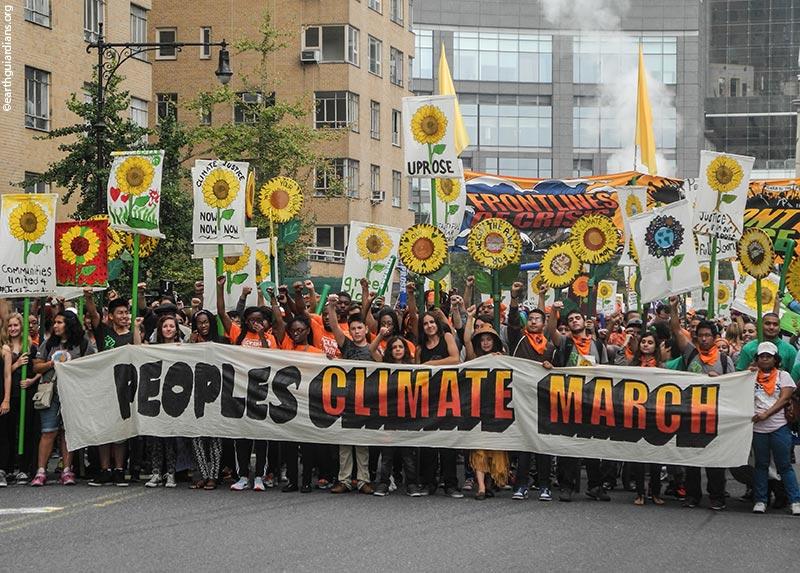
If you’re hopeless, find your tribe. If you feel alone, find your tribe. If your tribe is as pessimistic as you are, find more people to join your tribe who aren’t like that. I’d argue there are just as many incredible things happening in the world as there are bad things. Focus on the light and positivity. Take a moment to think about that and acknowledge how beautiful this world is.
I’d also say take responsibility and realize that everything you do in your life is rippling out and affecting the world. Realize that a lot of the things we are sad about, we can do something about just by changing our lifestyle.
What are the best ways our readers can reach out to young people, get them involved in their work, and tap into some of that brilliance you mentioned?
Definitely hit up earthguardians.org. The ability to create community with that platform is powerful. If you are an adult who is interested in engaging young people in creating change, you might want to foster a group and start an Earth Guardian crew. You can get a bunch of young people involved and you can start taking action, hosting meetings, doing educational programs—whatever it looks like. Whether you are an adult or a young person, starting an Earth Guardian crew is one of the most powerful things you can do.
What are the best ways our readers can reach out to young people, get them involved in their work, and tap into some of that brilliance you mentioned?
Definitely hit up earthguardians.org. The ability to create community with that platform is powerful. If you are an adult who is interested in engaging young people in creating change, you might want to foster a group and start an Earth Guardian crew. You can get a bunch of young people involved and you can start taking action, hosting meetings, doing educational programs—whatever it looks like. Whether you are an adult or a young person, starting an Earth Guardian crew is one of the most powerful things you can do.
Being an activist requires passion, but also bravery and stamina. It sounds like your schedule is incredibly busy. You have likely addressed the UN more times than most people have spoken in front of a group of people in a conference room. I imagine you have also had to think about potential dangers of speaking out against the fossil fuel industry. What is the source of your strength, determination, courage, and energy to keep going?
My source of inspiration is solely from knowing that I’m not alone and being around other people who are fighting for the same thing I am. People always ask me who my heroes are, and I draw my hope, inspiration, and strength from the other people in my generation who are fighting for things to be different than they are, and believing that things can be better. I also draw from a love and a passion for life. For nature, music, dank ass food, and everything beautiful about this world. That’s where I draw my passion from because that is what I’m fighting to protect.
